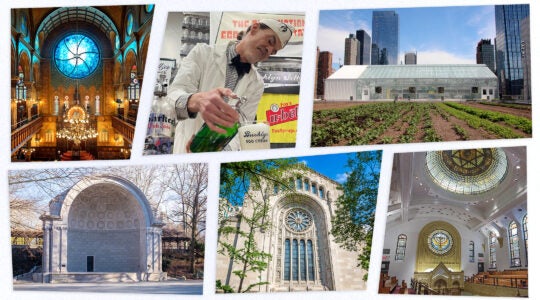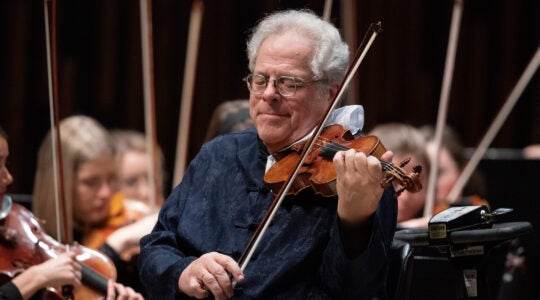In a crowded field of candidates vying to become the Democratic candidate for New York City mayor — a virtual guarantee of getting the job — Zohran Mamdani stands out in more ways than one.
At 33, Mamdani is the youngest candidate by far. A state Assembly member from Queens affiliated with the left-wing Democratic Socialists of America, he also has less experience in elected office than many of his competitors. And in a city that’s home to about 1 million Jews, Mamdani is a longtime critic of Israel who has supported the movement to boycott it.
Former New York Gov. Andrew Cuomo, who has made antisemitism a top issue in his campaign, is leading the polls by a wide margin — 37%, according to a Marist poll released last week. But Mamdani is polling a strong second — at 18% — and gaining traction among young voters who are drawn to his progressive policy agenda. Ranked-choice voting, introduced for city primaries in 2019, means he could well wind up as mayor.
Some Jewish New Yorkers have sworn him off, because of his progressive politics or his stances on Israel or both. But others might well vote for him, political insiders say.
“They’re going to vote for Mamdani, the younger people,” Hank Sheinkopf, the New York Democratic strategist, said in an interview. “I think there will likely be a generation split. And that will be shocking to the Jewish leadership.”
Mamdani’s campaign did not respond to multiple requests for an interview.
The candidate, who was narrowly elected to the state Assembly in 2021, wants to turn unused subway retail space into crisis drop-in centers for the homeless, freeze rent for rent-stabilized tenants, eliminate fares on city buses, increase the minimum wage and improve access to healthcare. He also wants to shift some funding for the police to a new Department of Community Safety that he says would take a less punitive approach to the city’s ills, including hate crimes.
His progressive stances extend into the Middle East, where the Democratic Socialists have long taken a strongly anti-Israel stance. In Albany, he sponsored “Not on Our Dime,” legislation that would prohibit nonprofit organizations from “engaging in unauthorized support of Israeli settlement activity” — a bill that, some worry, could penalize the charitable activity of many of the city’s Jewish organizations. Mamdani has also expressed support for the Boycott, Divest and Sanctions movement against Israel — though he hasn’t said whether he’d seek to have New York City participate if he became mayor.
In December 2023, he participated in a five-day hunger strike outside the White House to call for a ceasefire in the Israel-Hamas war in Gaza. More recently, he also spoke out against the detainment by ICE of Columbia University campus protester leader Mahmoud Khalil, and, in April, he appeared on the Twitch show of the left-wing, anti-Zionist streamer Hasan Piker — a vital gateway to younger voters where Piker regularly criticizes Israel.
Among Mamdani’s big-name supporters are Rep. Alexandria Ocasio-Cortez, among the highest-profile critics of Israel in Congress, and the Sunrise Movement, a climate group that is explicitly anti-Zionist.
As Mamdani’s star has risen, scrutiny on him has increased. On Friday morning, Politico reported that Mamdani declined to sign a state Assembly resolution recognizing Holocaust Memorial Day in New York on Jan. 27, and that he also declined to sign a resolution congratulating Israel on its 77th anniversary. (Mamdani signed Holocaust Memorial Day resolutions in 2021 and 2022, and publicly condemned the Holocaust on his social media.) In a video his campaign released that evening, Mamdani accused Politico of “falsely claiming that I refused to condemn the Holocaust,” calling the article a “baseless accusation.”
Under pressure from The Free Press, he also sharpened his answer to the question of whether he believes Israel has a right to exist, finally landing on an unqualified “yes.”
For some of New York City’s 1 million Jews, many of whom have strong ties to Israel, Mamdani’s background, stances and actions make him a nonstarter.
“I never thought that we were reaching the point where antisemitism is potentially on the ballot,” said Sara Forman, executive director of Solidarity PAC, a super PAC formed out of New York Solidarity Network, which aims to advance pro-Israel candidates in New York.
“Mamdani’s political compass is guided by a fixation on Israel and alignment with individuals and groups that support taking any means necessary to ensure a ‘river to the sea’ does not include the State of Israel — regardless of anything that he has been saying in the last couple of weeks,” she added.
While Solidarity PAC has endorsed multiple candidates for City Council races — including one Jewish challenger, Maya Kornberg, in a race against DSA-backed incumbent Shahana Hanif in Park Slope — it has not yet published its mayoral race guide. The guide is designed to inform Jewish voters and will include endorsements, Forman said.
NYSN’s “wall of shame” lists elected officials and advocacy groups that the group accuses of “justifying Hamas terrorism,” and the group calls on their members to “hold them accountable for their words” and tweet at them. That page includes both Mamdani and City Comptroller Brad Lander, a Jewish candidate for mayor who calls himself “a liberal Zionist who fiercely opposes the occupation.”
The progressive group Jews for Racial and Economic Justice, meanwhile, listed Lander and Mamdani in an unranked dual endorsement. The group has long called for a Gaza ceasefire and more recently has begun describing Israel’s actions there as a “genocide.” But Sophie Ellman-Golan, JFREJ’s director of strategic communications, said Israel wasn’t the animating factor in the group’s endorsements.
“Our priority issues are around making this a really affordable and safe and a welcoming home, to everyone who lives here, no matter when they got here or where they came from,” she said. “We’re in an affordability crisis. I grew up in the city. I know so many people who grew up in the city who are genuinely wondering: How can we possibly afford to stay here and raise a family here?”
Both Lander and Mamdani, she added, would bring a fresh perspective to the mayoralty. “Frankly, I think it will be incredibly powerful to elect our city’s first Muslim mayor in an increasingly Islamophobic political atmosphere,” Ellman-Golan said. “And morally incredibly powerful and long overdue to actually put a progressive Jew in the mayor’s office.”
Mamdani is the son of the Columbia University professor Mahmood Mamdani and the filmmaker Mira Nair. He was born in Uganda and lived in South Africa before moving to New York with his family at age 8 where he studied at the progressive Bank Street School for Children and graduated from the Bronx High School of Science, a selective public school.
While a student at Bowdoin College, he also co-founded the college’s chapter of Students for Justice in Palestine, which he credited as the “entryway” to his political career. Prior to his political career, he worked as a mental health counselor and a rapper under the name Mr. Cardamom, and he is known for his savvy with social media — especially TikTok — which has helped him with his campaign for mayor, particularly among younger voters.
But not all younger voters have been won over. Vai Subash, a 22-year-old Jewish graduate student at Columbia University who lives in Ridgewood, Queens, does not plan to rank Mamdai on the ballot.
“I don’t think [Mamdani is] a candidate that has shown any deep care about the Jewish community, especially since after Oct. 7,” said Subash, who has previously worked in women’s rights activism and for the Brooklyn Democrats. “He said some really pointed and harmful comments, in my opinion, and suffered from that.”
But she will not be ranking frontrunner Cuomo either, due to the sexual assault allegations that caused him to resign as governor in 2021.
“For that reason, and also based on allegations of corruption and mistreatment of staff, I cannot support him,” Subash said. “And I was really surprised to see how many people — I mean, honestly, it’s not a lot, but people within the Jewish community — that are backing him.”
Matt Seinuk, 29, is a civil engineer living in the East Village. For Seinuk, the three most important issues this election are affordable housing, the quality of public transit and Jewish communal safety. Israel, he said, is not high on the list.
“Should we really care about what the mayor of a city thinks about foreign politics?” Seinuk said.
He said he recognized that Jews make up a large proportion of the local population — and that Mamdani’s views on Israel are outside the mainstream for Jewish voters. But he said his own qualms were different.
“It’s a little bit scary to me that Zohran is pretty much leading the non-Cuomo candidates,” he said. “But also, as a civil engineer, I do not believe that Zohran’s plans for housing in New York are realistic, nor will [they] have real lasting effects on the cost of living.”
Meanwhile, Cuomo — who resigned as governor 2021 following an investigation into multiple sexual harassment allegations against him — seems to enjoy broad approval among like New York City Jewish voters, currently polling at around 26% among Jewish Democrats in New York City.
Cuomo has a checkered history with at least one set of Jewish voters, those from haredi Orthodox communities: In the fall of 2020, during the pandemic, he announced a cap on religious gathering sizes in some areas with high infection rates, a move that disproportionately affected Orthodox neighborhoods. In 2021, it was also reported that he had spoken disparagingly about Jewish people back in 2006 when he was running for attorney general, saying, “These people and their f—ing ‘tree houses’” about the Jewish holiday of Sukkot.
Still, Sheinkopf said, Cuomo holds appeal for Jews at the ballot box.
“He’s seen as a stabilizer in a time of chaos,” he said. “Jews don’t like instability, and they’re always looking for a non-Jewish king or queen to protect them. At the moment, he seems like the guy within the Democratic primary.”
By contrast, according to Sheinkopf, “Mamdani is seen, realistically, as a real threat to the Jewish community in New York City.”
Subash said she thought that in the end, Jewish voters would likely be motivated by a wide array of issues when they head to the primary polls on June 24 — and that Mamdani may not be their preferred candidate on any of them
“On the actual policy side, I don’t think he necessarily aligns with the larger Jewish community,” she said, noting that Mamdani’s proposals, like city-owned grocery stores, may be too radical among more centrist Jews.
“I have my own policies, perception, all of that, on Israel,” Subash added. “But I do think that this race is much more local to New York City, and there’s such a large Jewish community and Israeli community here that care about the issues that are happening on the ground here right now.”
Phylisa Wisdom, the executive director of the liberal advocacy group New York Jewish Agenda, said the election is likely to exact compromises from almost all Jewish voters.
“The reality, I think, for most Jews, is you’re not going to find a perfect match on Israel-Palestine politics perfectly,” she said, adding that New York City’s Jewish community has a broad range of concerns.
“There are some Jewish voters for whom alignment on Israel is critical,” Wisdom said. “And there are some for whom that’s one of the issues that they’re a little more flexible on, whereas criminal justice reform — they’re just not flexible on that.”
Correction: This story has been updated to reflect that Solidarity PAC’s yet-to-be-published voter guide will include endorsements.
The New York Jewish Week brings you the stories behind the headlines, keeping you connected to Jewish life in New York. Help sustain the reporting you trust by donating today.





